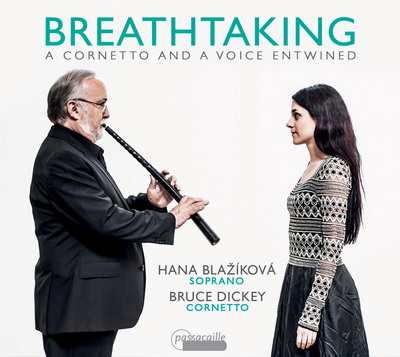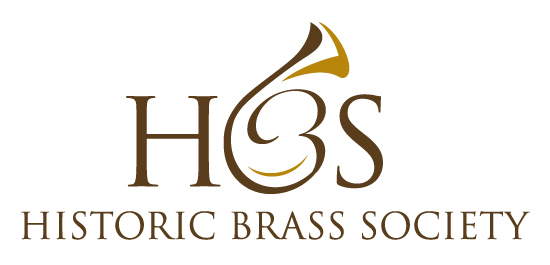 Hana Blažíková and Bruce Dickey, Breathtaking: A Cornetto and a Voice Entwined (Passacaille 1020, 2016). Recorded November, 2015.
Hana Blažíková and Bruce Dickey, Breathtaking: A Cornetto and a Voice Entwined (Passacaille 1020, 2016). Recorded November, 2015.
This remarkable recording is a perfect exemplification of the marriage of research and practice. This is not to characterize it as just an academic project because its main achievement is the artistic pleasure it generates. But an important point is also made. The fact is that the living presence of the cornetto in the modern musical world is due to Dickey. Not only is he a virtuoso, but the journey he has taken to understand the instrument in its own terms has, over decades, provided us with a series of revelations that he has been able to display with increasing eloquence. None surpasses this. The repertoire, the performance of the supporting players, the quality of the recording, the singing of the remarkable young Prague-born soprano Hana Blažíková, and of course Dickey’s own playing create one of the best recordings I have ever listened to.
The tracks display various configurations of the available resources, so for example, Marini’s Sonata seconda (1629) and Giovanni Battista Bassani’s Sonata prima a 3 are for instruments only and they are beautifully performed, but the central focus of the disc is the intimate and ‘entwined’ relationship between the cornetto and the human voice. The capacity of the instrument to imitate the human voice is widely evidenced and described in detail by Dickey in his extensive liner notes. Here the truth of it is revealed in practice and with great clarity. Indeed, it is the clarity of timbre and texture, and the finely nuanced articulations that pass between the instrument and the voice that make the recording so convincing.
The earliest work on the disc is Palestrina’s 1584 motet Dilectus meus mihi, which is performed with diminutions by Bruce Dickey. Otherwise, the greatest number of the works are seventeenth-century and Italian, including three arias from Alessandro Scarlatti’s 1697 opera drammatica Emireno, o vero il consiglio dell’ombra. There is also one contemporary work which is substantial and given centre stage: Mélena imí (Nigra sum), (2015), by the Greek composer Calliope Tsoupaki (b.1963), which was commissioned for the project. It is a setting of a text from the Song of Songs in Byzantine Greek which the composer refers to as ‘serene lyrical moment’ between the cornetto and the voice. It is scored for just voice, cornetto and viola da gamba and is utterly moving. I have not encountered a modern composer writing so naturally in the idiom of early instruments.
I find it hard to avoid being seriously enthusiastic about this CD because I believe it to be seriously important. I would travel a long way to catch a live performance, but in the absence of the opportunity I will play and replay this to remind me why it is worth trying to understand music as well as perform it. ‘Breathtaking’ is the right word.
-- Trevor Herbert



